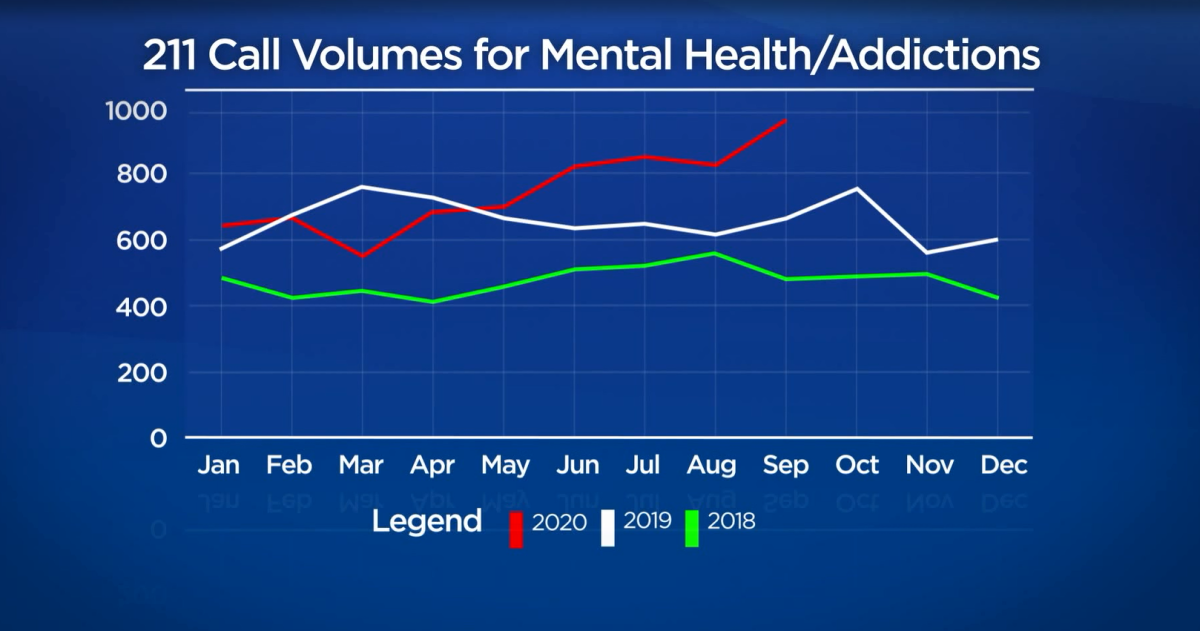Calls for mental health referrals have been on the rise during the coronavirus pandemic, especially in recent months, leading to concerns for how demand will grow during a cold and isolating winter on the way.

211 is a free service that helps connect people to social services both on the phone and online. Call volumes related to mental health and addictions to the service were already significantly up at the beginning of 2020 and the pandemic has seen those numbers continue to rise higher than previous years.
Sue Wilkinson is the executive director of the service’s central region, who said it is already seeing unprecedented needs for mental health supports.
“It’s really deeply concerning that we’re only in the early part of October,” she said, with calls up so high without the isolation and seasonal affective disorder which comes with winter.
“We’re receiving a lot of calls from people who really just need assurance. They need to know that there’s somewhere they can turn to … any time of day — that they can go someplace to at least have a sympathetic ear and somebody to help them.”
Carrie Moody has been tracking the data for 211 and expects the trend will grow as the pandemic continues.

Get weekly health news
“Everyday stresses are increasing and those are showing up in our mental health related calls,” Moody said.
“I think these numbers are really related to uncertainty, so whether that’s financial uncertainty, food insecurity, housing uncertainty, as people become more and more concerned about where they’re going to get their next paycheque.”
Call volumes aren’t the only thing that have been growing. At the beginning of the year, 211 saw more than double the amount of online searches for mental health and addiction supports than phone calls.
Those searches have continued to remain high as 2020 continues, which Wilkinson attributes to people who are likely still dealing with the stigma associated with treatment who are not yet ready to speak with someone directly.
Dr. David Gratzer with the Centre for Addition and Mental Health said people need to take extra care to spot changes in mood and behaviours of their friends and family as the pandemic continues. Especially during colder months, which he noted will take some adjustment in pandemic where we’re encouraged to stay apart.
“We need to be respectful, we need to be thoughtful, but we also need to be there for our family members and friends,” said Dr. Gratzer. “We’re going through a lot with this pandemic.”
Much like someone struggling with their treatment for diabetes, Dr. Gratzer said there’s a need to normalize mental health treatments. So if someone is struggling to get out of bed, leave their home, or have started to experience suicidal thoughts, getting treatment is important.
He said assistance can be found through a family doctor, CAMH, or even an emergency room if needed.
Dr. Gratzer said there are certain groups that are more at risk of running into mental health problems than others, including those who have had a past diagnosis or treatment. But it can extend to many others.
“People who have had past diagnoses and treatment, essential workers, people who have survived COVID,” he said.
“So I think particularly with these different individuals we as a society should make an extra effort to make sure they’re doing okay and if they’re not, to help them find help.”
With winter on the way, Dr. Gratzer also noted it’s important to get out of your personal bubble to avoid both avoid isolation and get some exercise. He said light exercise, as simple as a 20-minute walk every other day, is one way to help treat and prevent depression.
If you or someone you know are in need of mental health, addiction, or other social services, you can call 211 to be connected with someone 24/7. The GM of Toronto’s Office of Emergency Management Chief Matthew Pegg regularly reminds the public that “it’s OK to not feel OK.”








Comments